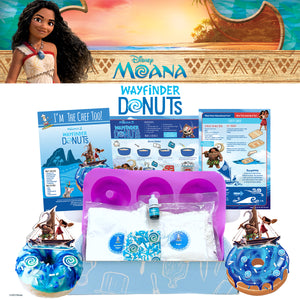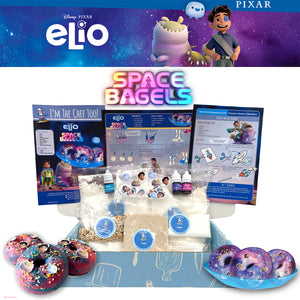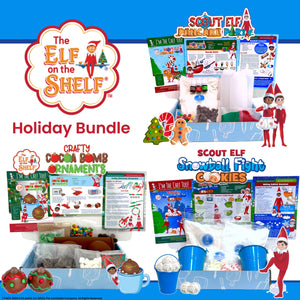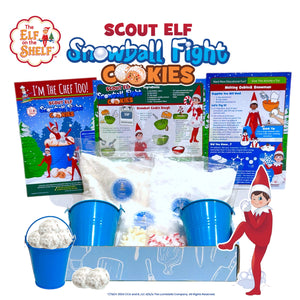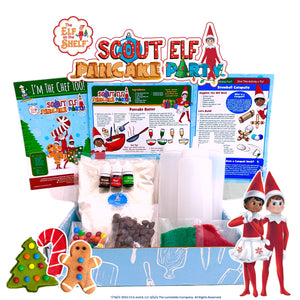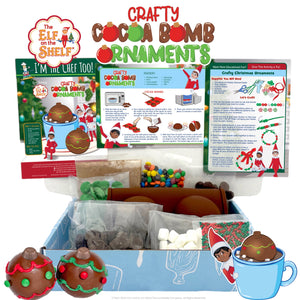Discover the Best STEM Kits for Kids: A Recipe for Learning & Fun

Table of Contents
- Introduction
- What Exactly is STEM, and Why Does it Matter for Kids?
- The Unique Magic of STEM Kits: More Than Just Toys
- Why Cooking STEM Kits are Among the Best STEM Kits for Kids
- Choosing the Best STEM Kits for Your Child: A Parent's Guide
- Maximizing the Learning with Your STEM Kit
- The Long-Term Benefits of STEM Engagement
- Beyond the Home Kitchen: STEM for Groups and Classrooms
- Conclusion
- FAQ
Imagine a quiet afternoon. Your child, usually glued to a screen, is instead meticulously measuring flour, excitedly watching dough rise, or marveling as colors transform in a mixing bowl. This isn't just wishful thinking; it's the everyday magic that unfolds when you introduce the power of STEM kits into their world. In an era where digital distractions abound, finding engaging, educational, and genuinely fun screen-free activities can feel like a quest. But what if the answer was right in your kitchen, disguised as a delicious adventure? This post will delve into the transformative world of STEM kits, highlighting why they are an invaluable tool for nurturing young minds, and showcasing how our unique cooking STEM kits offer an unparalleled blend of education and entertainment. The right STEM kits don't just teach facts; they spark curiosity, build confidence, and transform learning into an exciting, hands-on adventure, fostering crucial skills and unforgettable family moments.
Introduction
In a world increasingly driven by technological innovation and scientific discovery, preparing our children for the future means equipping them with more than just rote knowledge. It means fostering a deep-seated curiosity, the ability to think critically, and a passion for exploration. For many parents and educators, the challenge lies in making learning both impactful and genuinely enjoyable, especially when competing with the allure of digital devices. This is where the magic of STEM kits comes into play. Far from being just another toy, the best STEM kits for kids are carefully designed experiences that transform abstract concepts into tangible, exciting realities.
This blog post will explore the profound benefits of integrating STEM kits into your child's learning journey, from understanding the core components of Science, Technology, Engineering, and Math, to recognizing why hands-on engagement is so crucial. We'll specifically highlight how our unique approach at I'm the Chef Too! blends these vital disciplines with the arts and the joy of cooking, creating "edutainment" experiences that truly stand out. We aim to provide you with a comprehensive guide on how to choose the ideal STEM kit for your child, how to maximize its educational impact, and how these engaging activities can foster a lifelong love for learning, all while creating cherished family memories.
What Exactly is STEM, and Why Does it Matter for Kids?
Before we dive into the wonders of STEM kits, let's clarify what STEM truly represents. STEM is an acronym for Science, Technology, Engineering, and Mathematics. These four pillars are interconnected disciplines that form the backbone of our modern world, driving innovation, solving complex problems, and shaping the future.
- Science: This isn't just about memorizing facts from a textbook. Science is about observing the world, asking questions, forming hypotheses, conducting experiments, and drawing conclusions. It's about understanding the natural world and how it works, from the smallest atom to the vastness of the cosmos. For kids, this translates into exploring cause and effect, understanding how ingredients react in a recipe, or discovering why a volcano "erupts."
- Technology: Often misunderstood as just computers, technology encompasses any tool or system designed to solve a problem or make life easier. It's about applying scientific knowledge for practical purposes. In a child's world, this could be as simple as understanding how a blender works, using a measuring cup accurately, or even the design principles behind a cooking utensil.
- Engineering: This is the process of designing, building, and maintaining structures, machines, and systems. Engineers are problem-solvers who take ideas and turn them into reality. For kids, engineering skills are honed when they follow a recipe (a blueprint!), assemble different components, or figure out how to make a cake stand tall without collapsing. It’s about planning, testing, and refining.
- Mathematics: The universal language of numbers, patterns, and logic. Math is fundamental to all STEM fields, providing the tools for measurement, analysis, and prediction. Whether it's counting ingredients, understanding fractions in a recipe, or calculating baking times, math is constantly at play in hands-on STEM activities.
Why do these disciplines matter so much for our children? Because mastering STEM skills equips young minds with valuable life skills that extend far beyond the classroom or laboratory.
- Critical Thinking: Children learn to analyze situations, evaluate information, and form reasoned judgments.
- Problem-Solving: They encounter challenges and develop strategies to overcome them, fostering resilience and ingenuity.
- Creativity and Innovation: STEM encourages thinking outside the box, experimenting with new ideas, and finding novel solutions.
- Fine Motor Skills: Activities involving manipulation of small objects, precise measurements, and intricate constructions enhance dexterity.
- Collaboration: Many STEM activities, especially those done as a family or in a group, promote teamwork and communication.
- Adaptability: The world is constantly changing, and STEM education fosters the ability to learn new things and adjust to new situations.
At I'm the Chef Too!, our mission is rooted in this understanding. We believe that by blending food, STEM, and the arts, we create one-of-a-kind "edutainment" experiences that naturally spark curiosity and creativity in children. We're committed to facilitating family bonding and providing a screen-free educational alternative that lays a strong foundation for these crucial skills, all while having an incredibly delicious time.
The Unique Magic of STEM Kits: More Than Just Toys
In a toy store aisle, you might see countless options vying for your child's attention. But the best STEM kits for kids stand apart because they offer more than fleeting entertainment; they provide a structured pathway to active learning. Unlike passive toys that simply amuse, STEM kits invite children to engage, experiment, and discover.
Think about it: a typical toy might offer a single play experience. A STEM kit, however, is a miniature laboratory, an engineering workshop, or a culinary classroom packed into a box. It transforms abstract concepts, often perceived as daunting in traditional academic settings, into tangible, exciting realities. This hands-on approach is incredibly powerful for several reasons:
- Concrete Understanding: Children learn best by doing. When they can physically manipulate materials, observe reactions, and build something with their own hands, the concepts become concrete and memorable. They're not just reading about chemical reactions; they're seeing the fizz and bubble as ingredients combine.
- Intrinsic Motivation: The inherent curiosity of children is ignited when they are given the tools and freedom to explore. STEM kits tap into this natural desire to understand "how things work," making learning feel less like a chore and more like an exciting investigation. The anticipation of a delicious outcome, especially with our cooking STEM kits, adds an extra layer of motivation.
- Developing Process Skills: Beyond specific scientific facts, STEM kits teach vital process skills. Children learn to follow instructions, troubleshoot problems, make predictions, observe changes, and analyze results. These are transferable skills that benefit them in all areas of life, from academics to future careers.
- Problem-Solving in Action: When an experiment doesn't go as planned, or a structure doesn't hold up, children are naturally prompted to identify the problem and brainstorm solutions. This iterative process of trial and error is fundamental to innovation and builds resilience.
- Bridging Theory and Practice: STEM kits effectively bridge the gap between theoretical knowledge and practical application. A child might learn about levers in a book, but building a simple machine with a kit allows them to experience how a lever actually works to lift an object.
- Structured Exploration: While encouraging open-ended play, the best STEM kits also provide a clear framework. They come with necessary materials, step-by-step instructions, and often background information that guides the child through the learning process without stifling their creativity. This balance is key to fostering both independent thought and foundational understanding.
When you choose a STEM kit, you're not just purchasing a product; you're investing in an experience that cultivates critical thinking, sparks innovation, and builds a genuine love for learning. It's about empowering children to become active participants in their education, rather than passive recipients of information.
Why Cooking STEM Kits are Among the Best STEM Kits for Kids
While many fantastic STEM kits exist, our unique approach at I'm the Chef Too! stands out by blending the rigorous principles of STEM with the engaging, multi-sensory world of culinary arts and creative expression. This combination creates an "edutainment" experience that is not only profoundly educational but also incredibly fun, leading to a delicious, tangible outcome.
The I'm the Chef Too! Difference: A Unique Recipe for Learning
At I'm the Chef Too!, our mission is to transform learning into an adventure. We believe that the kitchen is a natural laboratory, where complex concepts come alive through hands-on activity. Our kits are developed by mothers and educators, ensuring that each experience is thoughtfully designed to be age-appropriate, engaging, and genuinely educational. We are committed to:
- Blending Food, STEM, and the Arts: This holistic approach means children aren't just learning science; they're also honing their artistic skills through decoration and presentation, and developing life skills through the act of cooking.
- Sparking Curiosity and Creativity: Each kit is a themed adventure designed to ignite imagination, from exploring the cosmos with edible planets to digging for dinosaur fossils in fudgy treats.
- Facilitating Family Bonding: Our kits are perfect for collaborative learning, providing a wonderful opportunity for parents, grandparents, and siblings to connect, teach, and create together in a joyful, shared experience.
- Providing a Screen-Free Educational Alternative: In a world dominated by screens, our kits offer a refreshing break, encouraging real-world interaction, sensory exploration, and hands-on engagement.
- Teaching Complex Subjects Through Tangible, Hands-On Adventures: We take abstract scientific principles and make them concrete. Kids don't just read about chemical reactions; they see them in action as their Erupting Volcano Cakes bubble over with deliciousness.
Let's break down how each component of STEM, plus the often-overlooked "A" for Arts, comes alive in our cooking kits:
Science in the Kitchen: Everyday Chemistry & Physics
The kitchen is a vibrant, edible laboratory where scientific principles are at play in every recipe.
- Chemical Reactions: Baking is essentially applied chemistry. When kids bake our Erupting Volcano Cakes, they're not just making a dessert; they're witnessing an acid-base reaction (baking soda and vinegar) that produces carbon dioxide gas, causing the "lava" to fizz and bubble. Similarly, the leavening agents in cakes and cookies demonstrate how gases are produced to create airy textures.
- States of Matter: Children observe liquids turning into solids (like butter hardening in the fridge) or solids turning into liquids (chocolate melting). They learn about evaporation as water disappears from a mixture during baking, or condensation as steam forms on a cool surface.
- Heat Transfer: Understanding how heat cooks food – conduction (pan to food), convection (air circulating in the oven), and radiation (broiler) – is a fundamental physics concept experienced firsthand. They learn why cookies bake faster on a dark pan or why a cake needs to reach a certain internal temperature.
- Emulsification: Making frosting or sauces involves combining ingredients that normally don't mix, like oil and water, and seeing how an emulsifier (like egg yolk or lecithin) helps them blend smoothly.
- Density: Layering different liquids or batters, like in a layered dessert, demonstrates principles of density, as heavier liquids sink below lighter ones.
Technology in the Kitchen: Tools for Transformation
While not always high-tech, kitchen tools represent fundamental technological advancements designed to make tasks easier and more efficient.
- Measuring Tools: Cups and spoons are basic technologies that ensure precision and consistency in recipes. Children learn about volume and capacity, and the importance of accurate measurement.
- Oven and Stove: These appliances are complex technologies that control heat, allowing for precise cooking and baking. Learning to use them safely (with adult supervision) introduces concepts of temperature control and energy.
- Simple Machines: A whisk acts as a lever, a can opener uses a wedge, and a rolling pin applies force over an area. Even seemingly simple tools demonstrate principles of mechanical advantage.
Engineering in the Kitchen: Building Edible Structures
Every recipe is an engineering blueprint, and every baked good is a delicious structure.
- Following Blueprints: A recipe is essentially a set of engineering instructions. Children learn the importance of sequence, precision, and following steps to achieve a desired outcome.
- Structural Integrity: When making cookies, cakes, or even building a gingerbread house, kids learn about stability, balance, and how ingredients contribute to the final structure. Why does a cake hold its shape? How can you make a cookie sturdy enough to decorate?
- Problem-Solving & Adaptation: If dough is too sticky, what do you do? If frosting is too runny, how can you fix it? These challenges encourage creative problem-solving and adapting the "design" (recipe) to achieve the desired result. For instance, when making Peppa Pig Muddy Puddle Cookie Pies, they learn about creating a sturdy cookie base and a smooth, "muddy" topping that sets just right.
Mathematics in the Kitchen: Numbers in Action
Math is woven into every step of cooking and baking, making it a practical and relevant subject.
- Measurement & Fractions: This is perhaps the most obvious. Children use measuring cups and spoons, learning about whole numbers, halves, quarters, and even eighths. They understand how two halves make a whole, or how to double a recipe.
- Counting: Counting out ingredients, sprinkles, or cookie cutters.
- Time: Understanding baking times, cooling times, and how elapsed time affects the outcome.
- Ratios & Proportions: Implicitly, kids learn about ratios when they see how different amounts of ingredients affect the final product. Doubling a recipe demonstrates proportional reasoning.
- Geometry: Recognizing shapes of cookies, cakes, or cutting techniques (e.g., slicing a round cake into wedges).
Arts & Creativity in the Kitchen: Edible Masterpieces
The "A" in STEAM (Science, Technology, Engineering, Arts, and Mathematics) is where the culinary world truly shines.
- Decoration: Decorating cookies, cakes, or cupcakes allows for immense creative expression. Children experiment with colors, textures, and designs.
- Presentation: Learning how to arrange food beautifully on a plate or in a box teaches aesthetic principles and attention to detail.
- Sensory Exploration: Cooking engages all five senses – the smell of baking, the feel of dough, the sight of vibrant colors, the sound of sizzling, and of course, the taste of the final product. This multi-sensory engagement enhances learning and memory.
Our kits, like the Galaxy Donut Kit, exemplify this blend, allowing children to explore astronomy by creating their own edible solar system, then decorate it with vibrant glazes and cosmic sprinkles, turning a science lesson into an artistic masterpiece.
Beyond the academic subjects, cooking STEM kits also foster crucial life skills:
- Following Instructions: A fundamental skill for learning and daily life.
- Patience and Persistence: Waiting for dough to rise, for cookies to bake, or for frosting to set teaches patience. Overcoming a tricky step builds persistence.
- Responsibility: Learning to clean up after themselves and care for tools.
- Confidence: The pride of creating something delicious and seeing their hard work pay off is immeasurable.
- Healthy Habits: Becoming familiar with ingredients and the process of making food can encourage healthier eating choices.
Ready for a new adventure every month that blends all these amazing elements? Join The Chef's Club and enjoy free shipping on every box, bringing these unique learning experiences right to your door!
Choosing the Best STEM Kits for Your Child: A Parent's Guide
With so many options available, selecting the best STEM kits for kids can feel overwhelming. The key is to find kits that align with your child's age, interests, and learning style, while also offering genuine educational value and opportunities for connection.
1. Age Appropriateness: Matching Complexity to Developmental Stage
This is crucial for ensuring both engagement and safety. A kit that's too simple will bore an older child, while one that's too complex can lead to frustration for a younger one.
- Preschool (Ages 3-5): At this stage, focus on sensory exploration, basic cause-and-effect, and simple motor skills. Our kits for this age group emphasize mixing, pouring, and simple decorating, often with pre-measured ingredients that minimize complex steps. The goal is to introduce the joy of creation and discovery. For example, a kit might involve creating colorful dough or simple, no-bake treats that allow for lots of hands-on manipulation and sensory play.
- Early Elementary (Ages 6-8): Children in this age range are ready for more structured instructions and can grasp basic scientific terms. They enjoy hands-on experiments with clear, observable results. Our kits for this group introduce concepts like chemical reactions (like the fizz in our Erupting Volcano Cakes), basic measurement, and following multi-step processes. They can start to understand the "why" behind what's happening.
- Upper Elementary (Ages 9-11): Kids here can handle more independent work, deeper scientific principles, and multi-step projects. They enjoy kits that challenge them to think critically and solve minor problems. Our kits for this age group might delve into more intricate baking techniques, precise measurements, or more complex scientific explanations behind the culinary magic. They're ready to read and follow recipes with greater autonomy, though adult supervision is always recommended.
- Pre-Teen (Ages 12+): For this age group, look for kits that offer advanced concepts, encourage design thinking, and allow for greater customization and experimentation. While our primary focus is younger children, the foundational skills learned with our kits prepare them for more complex culinary and scientific pursuits. The independence and problem-solving skills fostered by our kits are invaluable as they grow.
2. Child's Interests: Fueling Their Passions
The best way to ensure engagement is to choose a kit that aligns with your child's existing passions. Are they obsessed with outer space? Do they love dinosaurs? Are they fascinated by animals or beloved characters?
- Themed Adventures: At I'm the Chef Too!, our kits are designed around exciting themes. For a child fascinated by space, our Galaxy Donut Kit transforms donut decorating into an exploration of edible planets and constellations. If they're into dinosaurs, a Fudgy Fossil Dig kit turns baking into an archaeological excavation. Even beloved characters can make learning fun, like when kids make Peppa Pig Muddy Puddle Cookie Pies, where they learn about textures and simple design while enjoying a familiar theme.
- Broadening Horizons: While catering to current interests is great, STEM kits can also introduce new passions. A child who loves art might discover a love for chemistry through colorful edible experiments.
3. Learning Style: Catering to How They Learn Best
While all STEM kits are inherently hands-on (kinesthetic), consider how they integrate other learning styles:
- Kinesthetic Learners: These children thrive on doing, touching, and manipulating. Our cooking kits are perfect for them, as they involve mixing, kneading, measuring, and decorating.
- Visual Learners: Clear, step-by-step instructions with illustrations are key. Our kits include detailed, easy-to-follow recipe cards that are highly visual.
- Auditory Learners: Talking through the steps, asking questions, and explaining the science aloud can enhance their learning. This makes our kits ideal for family bonding, where parents can narrate and discuss the process.
4. Kit Components: What's Included and Why It Matters
A well-designed STEM kit should provide everything you need (or most of it) to minimize frustration and maximize the fun.
- Pre-measured Dry Ingredients: This is a hallmark of I'm the Chef Too! kits. It eliminates the hassle of grocery shopping for obscure ingredients and ensures accuracy, reducing potential for errors and saving time.
- Specialty Supplies: Unique cookie cutters, edible decorations, molds, or specific tools that make the themed experience truly special.
- Clear, Illustrated Instructions: Easy-to-follow recipe cards that guide children (and adults!) through each step.
- Educational Content: Information that explains the STEM concepts behind the activity in an age-appropriate way. Our kits include fun facts and learning points.
5. Parent Involvement: Opportunities for Bonding
Consider how much supervision or assistance the kit requires. While some kits are designed for more independent play, our cooking STEM kits are wonderful for shared experiences. They create opportunities for:
- Quality Time: Unplugged moments spent creating, learning, and laughing together.
- Teaching Moments: Parents can guide, explain, and encourage critical thinking.
- Shared Accomplishment: The joy of creating and enjoying the delicious outcome together.
6. Safety Considerations: Always a Priority
Especially with cooking kits, safety is paramount.
- Adult Supervision: All our cooking activities require adult supervision, especially when using ovens, stoves, or sharp tools.
- Food Allergies: Always check ingredient lists carefully for potential allergens. Our kits list all ingredients, allowing you to make informed decisions.
Not ready to subscribe for monthly adventures? We understand! You can still explore the fun and learning at your own pace. Browse our complete collection of one-time kits to find the perfect theme for your little learner. Or, if you're ready to commit to ongoing educational fun, remember that a new adventure is delivered to your door every month with free shipping in the US when you Join The Chef's Club!
Maximizing the Learning with Your STEM Kit
Simply having one of the best STEM kits for kids is the first step; the next is to ensure you maximize its educational potential and the overall enjoyment of the experience. Here’s how you can turn every kit into a profound learning adventure and a memorable family moment:
Before You Begin: Setting the Stage for Success
- Read Through the Instructions Together: Before opening any ingredients, sit down with your child and read the recipe card or instruction manual from start to finish. Discuss what you'll be doing. This helps them understand the entire process and anticipate steps, enhancing their engineering and planning skills.
- Gather All Necessary Tools: Our kits come with pre-measured dry ingredients and specialty supplies, but you'll need common kitchen tools like bowls, spoons, and an oven. Make sure everything is ready and within reach. This teaches organization and preparation.
- Discuss the Theme and Concepts: If it's a Galaxy Donut Kit, talk about planets, stars, and the solar system beforehand. For Erupting Volcano Cakes, chat about volcanoes, lava, and chemical reactions. This pre-activity discussion sets the context and primes their minds for learning.
- Set Realistic Expectations: Remind your child (and yourself!) that the goal is the process, the learning, and the fun, not necessarily a perfectly polished outcome. Mistakes are part of learning. This fosters a growth mindset.
During the Activity: Engaging and Exploring
-
Ask Open-Ended Questions: Instead of just giving instructions, ask questions that encourage critical thinking and observation:
- "What do you think will happen when we add this ingredient?" (Prediction, Science)
- "Why do you think the dough feels different now?" (Observation, Science)
- "If we want to make twice as many cookies, how much flour would we need?" (Math, Problem-Solving)
- "What part of this recipe reminds you of building something?" (Engineering)
- "How could we make this look even more like a muddy puddle?" (Art, Creativity, for kits like Peppa Pig Muddy Puddle Cookie Pies)
- Encourage Observation and Prediction: Guide your child to notice changes in texture, color, and smell. "Look at how the batter is thickening! What do you think is causing that?"
- Allow for Mistakes and Problem-Solving: If a measurement is off or something doesn't look quite right, resist the urge to immediately fix it yourself. Instead, ask, "What do you think went wrong here? How can we fix it?" This empowers them to think critically and develop resilience.
- Emphasize the Process, Not Just the Product: Celebrate every step – the careful measuring, the enthusiastic mixing, the patient waiting. The learning happens throughout the journey, not just at the end.
- Connect to Real-World Applications: Point out how the skills they're using in the kitchen apply elsewhere. "Just like we followed this recipe step-by-step, engineers follow blueprints to build bridges!" or "When you measure, you're using math that scientists use every day!"
After the Activity: Reflecting and Reinforcing
- Discuss Results and Observations: Once the cooking is done and the treats are cooling (or being enjoyed!), talk about what happened. "Why did the cake rise?" "What was your favorite part of making this?"
- Connect to Broader Concepts: Briefly explain the scientific principles in simple terms again. "Remember how the baking soda and vinegar reacted? That's a chemical reaction!"
- Document the Experience: Take photos, draw pictures, or have your child write a few sentences about what they made and learned. This reinforces memory and provides a tangible record of their achievement.
- Enjoy the Delicious Outcome! This is the ultimate reward and a powerful motivator for future culinary STEM adventures. Sharing the treats they made builds immense pride and satisfaction.
Remember, the goal is to foster a love for learning and discovery. By actively engaging with your child before, during, and after the activity, you transform a fun kit into a truly enriching educational experience.
Ready to make learning an ongoing adventure? With The Chef's Club, a new themed cooking STEM kit is delivered right to your door every month, complete with pre-measured dry ingredients, specialty supplies, and engaging educational content. It's the ultimate convenience for consistent, screen-free fun and learning!
The Long-Term Benefits of STEM Engagement
Investing in the best STEM kits for kids, particularly those that integrate hands-on, engaging activities like cooking, yields benefits that extend far beyond the immediate joy of creating something delicious. These foundational experiences lay the groundwork for a future filled with curiosity, confidence, and capability.
Fostering a Lifelong Love for Learning
Perhaps the most significant long-term benefit of early STEM engagement is the cultivation of intrinsic motivation for learning. When children discover that science, technology, engineering, and math are not abstract, intimidating subjects but rather exciting tools for understanding and shaping their world, learning transforms from a chore into a passion. Our "edutainment" approach at I'm the Chef Too! is specifically designed to make learning so enjoyable that children want to explore more, ask more questions, and delve deeper into how things work. This early spark can ignite a lifelong journey of discovery and intellectual growth, making them proactive learners in school and beyond.
Building Confidence and Self-Efficacy
There's an unparalleled sense of accomplishment that comes from successfully completing a project with your own hands. Whether it's seeing a cake rise perfectly, decorating a cookie with artistic flair, or understanding why a chemical reaction occurred, these small victories build immense confidence. Children learn that they are capable of understanding complex ideas, following instructions, and creating something tangible. This boosts their self-efficacy – their belief in their own ability to succeed – which is vital for tackling challenges in all areas of life, from academics to social interactions. The pride they feel when sharing their homemade Peppa Pig Muddy Puddle Cookie Pies or explaining the "eruption" of their Erupting Volcano Cakes is truly priceless.
Developing Resilience and Problem-Solving Skills
Not every experiment goes perfectly the first time. The batter might be too thick, the dough might not rise as expected, or a decoration might smudge. These moments of challenge are invaluable learning opportunities. STEM kits, by their very nature, invite experimentation and sometimes, failure. When children encounter a snag and are encouraged to figure out a solution ("What do you think we could do differently next time?"), they develop crucial problem-solving skills and resilience. They learn that setbacks are not endpoints but rather opportunities to learn, adjust, and try again. This iterative process of design, test, and refine is a core tenet of engineering and a critical life skill.
Preparing for the Future: Skills for Academic and Career Paths
While we don't promise that every child will become a top scientist or engineer, the foundational skills fostered by STEM engagement are universally valuable. Critical thinking, logical reasoning, creativity, collaboration, and adaptability are highly sought-after in virtually every academic field and career path in the 21st century. By engaging with STEM early, children develop a comfort and familiarity with these subjects, potentially opening doors to exciting academic pursuits and future professional opportunities they might not have considered otherwise. They learn to approach challenges with a scientific mindset, break down complex problems, and innovate solutions – skills that are essential in a rapidly evolving world.
Strengthening Family Bonds and Creating Cherished Memories
Perhaps one of the most heartwarming long-term benefits is the strengthening of family relationships. Our cooking STEM kits are designed to be shared experiences. Spending quality, screen-free time together in the kitchen, collaborating on a project, laughing at minor mishaps, and celebrating successes creates powerful bonds and lasting memories. These are the moments children will look back on fondly, remembering the joy of creating with their loved ones, far more than any passive screen time. It's about building a shared history of discovery and fun.
At I'm the Chef Too!, we believe in these profound, lasting benefits. That's why we meticulously design each kit to be a complete experience, containing pre-measured dry ingredients and specialty supplies, ready for your family's next adventure. Give the gift of learning that lasts all year with a 12-month subscription to our STEM cooking adventures – the perfect way to ensure a continuous stream of discovery, skill-building, and family fun. Join The Chef's Club today! Or, if you prefer to try individual experiences, remember you can always Browse our complete collection of one-time kits to find the perfect starting point for your child's STEM journey.
Beyond the Home Kitchen: STEM for Groups and Classrooms
The power of hands-on STEM learning isn't confined to the home kitchen. Our unique cooking STEM kits are also incredibly versatile tools for group settings, offering engaging and educational experiences for classrooms, after-school programs, homeschool co-ops, and summer camps.
Imagine a group of children collaborating to create a batch of Galaxy Donuts, discussing the planets and constellations as they mix and decorate. Or a classroom buzzing with excitement as each small group works on their own Erupting Volcano Cakes, observing the chemical reactions firsthand. These activities naturally foster teamwork, communication, and shared discovery in a dynamic, fun environment.
For educators and group leaders, our programs offer a unique way to bring science, technology, engineering, and math to life, often integrating art and culinary skills in a way that traditional curricula might not. The tangible outcome of delicious treats provides a powerful motivator and a memorable learning experience that resonates with children long after the activity is over. We offer flexible options, including programs with and without food components, to suit various needs and settings. If you're looking to bring this unique "edutainment" experience to a larger group, we encourage you to learn more about our versatile programs for schools and groups. It's an excellent way to extend the joy of hands-on STEM learning to more children in a structured, engaging way.
Conclusion
In a world that increasingly values innovation, critical thinking, and adaptability, providing our children with opportunities to explore Science, Technology, Engineering, and Mathematics is not just beneficial—it's essential. The best STEM kits for kids offer a gateway to this crucial learning, transforming abstract concepts into exciting, hands-on adventures.
At I'm the Chef Too!, we've taken this concept a step further by blending the foundational elements of STEM with the engaging, multi-sensory world of culinary arts and creative expression. Our unique "edutainment" experiences are designed by mothers and educators to spark curiosity, foster creativity, and provide a much-needed screen-free alternative for children. From understanding chemical reactions in our Erupting Volcano Cakes to exploring astronomy with our Galaxy Donut Kit, every project is a delicious journey of discovery. We believe in the power of shared experiences, facilitating family bonding and creating cherished memories around the kitchen table.
The journey of learning is a continuous adventure, and with I'm the Chef Too!, it's always an exciting and delicious one. We're committed to nurturing young minds, building their confidence, and instilling a lifelong love for exploration and discovery.
Ready to embark on a new adventure every month? Don't miss out on the fun, learning, and family bonding that our unique STEM cooking kits provide. Join The Chef's Club today and enjoy the convenience of pre-measured ingredients, specialty supplies, and free shipping on every box, delivered right to your door. Give the gift of learning that lasts all year with our flexible 3, 6, and 12-month pre-paid plans. Your next delicious discovery awaits!
FAQ
What age are STEM kits for?
STEM kits are available for a wide range of ages, generally from preschool (ages 3-5) all the way through high school and beyond. At I'm the Chef Too!, our cooking STEM kits are primarily designed for children aged 3-12+, with varying levels of complexity to suit different developmental stages and encourage appropriate levels of adult supervision and interaction. We focus on making activities accessible and engaging for young learners.
Are I'm the Chef Too! kits safe for kids?
Yes, safety is a top priority for us. Our kits are designed with age-appropriateness in mind, and all cooking activities require adult supervision, especially when using kitchen appliances like ovens or stoves. We provide clear, easy-to-follow instructions, and our ingredients are pre-measured dry components, reducing the need for children to handle bulk ingredients or complex measuring. We encourage parents to always review ingredients for any specific dietary needs or allergies.
Do I need special equipment for I'm the Chef Too! kits?
Our kits are designed for convenience and typically only require common kitchen tools that most households already possess, such as mixing bowls, spoons, measuring cups (for liquids, as dry ingredients are pre-measured), and an oven or microwave. Each kit's instruction card will clearly list any additional tools you'll need, ensuring you're fully prepared for your culinary adventure.
What makes I'm the Chef Too! different from other STEM kits?
I'm the Chef Too! offers a truly unique "edutainment" experience by blending Science, Technology, Engineering, and Mathematics (STEM) with the Arts and the joy of cooking. Unlike many traditional STEM kits that focus solely on building or experiments, our kits result in delicious, edible creations. This multi-sensory approach makes learning tangible, relatable, and incredibly fun. Our kits are developed by mothers and educators, providing a screen-free alternative that sparks curiosity, fosters creativity, and facilitates memorable family bonding moments around the kitchen.
Can I buy I'm the Chef Too! kits as a one-time purchase?
Absolutely! While we love the convenience and continuous learning offered by our monthly Chef's Club subscription, we also understand that you might want to try a specific theme or purchase a kit for a special occasion. You can Browse our complete collection of one-time kits in our shop, where you'll find a wide variety of our popular cooking STEM adventures available for individual purchase.


